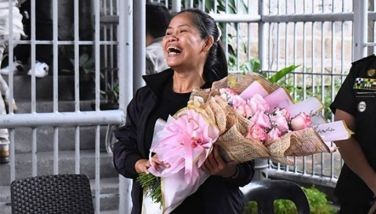Press freedom rankings: RP 142nd
October 25, 2006 | 12:00am
The Philippines was near the bottom of a list drawn up by the media advocacy group Reporters Without Borders (Reporters Sans Frontieres) that ranked countries in terms of press freedom.
The Philippines placed 142nd out of 168 in the list that had northern European countries taking the top spot and North Korea – lately under United Nations sanctions for nuclear tests – bringing up the rear. The Philippines slipped three notches from 139 in 2005.
"Journalists in the Philippines pay a high price for their outspokenness, with the year marked by seven murders and as many murder attempts," the RSF said in its annual Worldwide Press Freedom Index.
Finland, Iceland, Ireland and the Netherlands are where media are most free, according to the Paris-based Reporters Without Borders. Rounding out the top nine are the Czech Republic, Estonia, Norway, Slovakia and Switzerland.
Tied at 10th were Hungary, Latvia, Portugal and Slovenia.
The Philippines, tagged as the most dangerous country in the world for journalists next to Iraq, was tied at 142 with the Democratic Republic of Congo.
It was just a few rungs ahead of Singapore at 146, which had banned the Far Eastern Economic Review for publishing an article critical of the minister mentor, and strife-torn Iraq at 154.
RSF cited the spate of killings and harassment, particularly the multiple libel cases filed by First Gentleman Jose Miguel Arroyo, as threats to press freedom in the country.
The advocacy group mentioned the murder of radio journalist George Benaojan in Cebu three days after the conviction of police officer Guillermo Wapile for the 2002 murder of Edgar Damalerio.
It noted that despite the arrest and conviction of some killers, journalists remain at risk, especially those who expose corruption or trafficking of local authorities.
Earlier this year the killers of Mindanao-based Marilyn Esperat were meted sentences of life imprisonment. But many more cases remain unsolved, according to the National Union of Journalists of the Philippines, which was not surprised by the report.
"Well, it is not really a surprise because in the past three years the Philippines has been getting a very low grade from international media watchdogs," NUJP secretary general Weng Carranza said.
RSF scored President Arroyo for trying "to stop the press from doing its job of safe-guarding democracy."
Mrs. Arroyo however launched last year the P5-million press freedom fund, and later gave police a 10-week deadline to solve the killings.
The United States, where the Fourth Estate was instrumental in bringing down the Nixon administration in the mid-70s, was ranked at 53rd along with Botswana, Croatia and Tonga.
Tailenders with North Korea, in descending order, are Saudi Arabia (161), Iran, China, Burma, Cuba, Eritrea and Turkmenistan. – AP, ABS-CBN Interactive
The Philippines placed 142nd out of 168 in the list that had northern European countries taking the top spot and North Korea – lately under United Nations sanctions for nuclear tests – bringing up the rear. The Philippines slipped three notches from 139 in 2005.
"Journalists in the Philippines pay a high price for their outspokenness, with the year marked by seven murders and as many murder attempts," the RSF said in its annual Worldwide Press Freedom Index.
Finland, Iceland, Ireland and the Netherlands are where media are most free, according to the Paris-based Reporters Without Borders. Rounding out the top nine are the Czech Republic, Estonia, Norway, Slovakia and Switzerland.
Tied at 10th were Hungary, Latvia, Portugal and Slovenia.
The Philippines, tagged as the most dangerous country in the world for journalists next to Iraq, was tied at 142 with the Democratic Republic of Congo.
It was just a few rungs ahead of Singapore at 146, which had banned the Far Eastern Economic Review for publishing an article critical of the minister mentor, and strife-torn Iraq at 154.
RSF cited the spate of killings and harassment, particularly the multiple libel cases filed by First Gentleman Jose Miguel Arroyo, as threats to press freedom in the country.
The advocacy group mentioned the murder of radio journalist George Benaojan in Cebu three days after the conviction of police officer Guillermo Wapile for the 2002 murder of Edgar Damalerio.
It noted that despite the arrest and conviction of some killers, journalists remain at risk, especially those who expose corruption or trafficking of local authorities.
Earlier this year the killers of Mindanao-based Marilyn Esperat were meted sentences of life imprisonment. But many more cases remain unsolved, according to the National Union of Journalists of the Philippines, which was not surprised by the report.
"Well, it is not really a surprise because in the past three years the Philippines has been getting a very low grade from international media watchdogs," NUJP secretary general Weng Carranza said.
RSF scored President Arroyo for trying "to stop the press from doing its job of safe-guarding democracy."
Mrs. Arroyo however launched last year the P5-million press freedom fund, and later gave police a 10-week deadline to solve the killings.
The United States, where the Fourth Estate was instrumental in bringing down the Nixon administration in the mid-70s, was ranked at 53rd along with Botswana, Croatia and Tonga.
Tailenders with North Korea, in descending order, are Saudi Arabia (161), Iran, China, Burma, Cuba, Eritrea and Turkmenistan. – AP, ABS-CBN Interactive
BrandSpace Articles
<
>
- Latest
- Trending
Trending
Latest






























